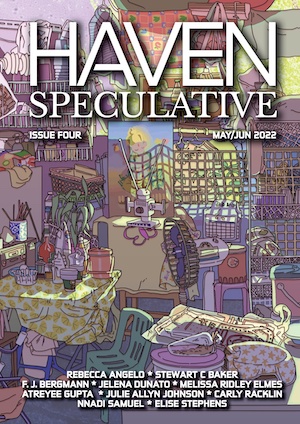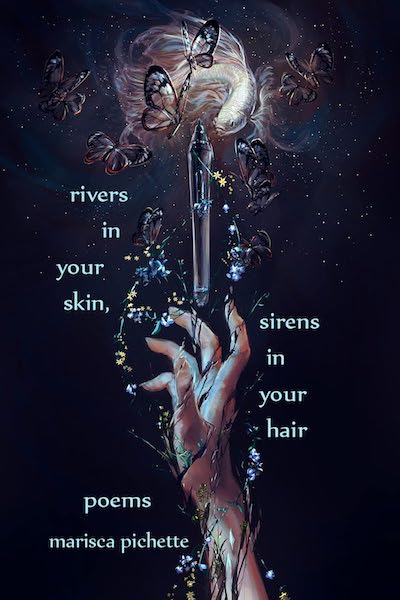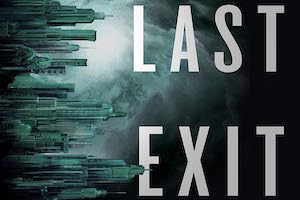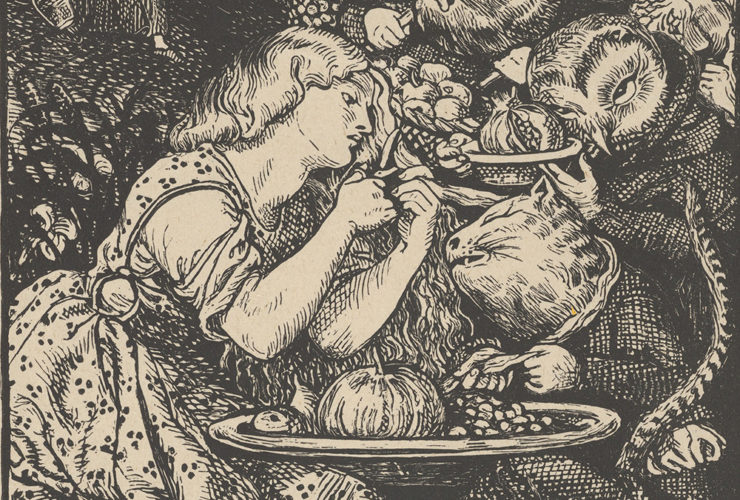Welcome back to Reading the Weird, in which we get girl cooties all over weird fiction, cosmic horror, and Lovecraftiana—from its historical roots through its most recent branches.
This week, we cover Deborah L. Davitt’s “Feeding the Dead”, first published in Polu Texni: A Magazine of Many Arts in January 2021, and Carly Racklin’s “Unearthen”, first published in Bird’s Thumb in October 2016 and reprinted in Haven Speculative in May 2022. Spoilers ahead!
“He says he’s tired of eating rotten fruit; he wants to know what it is like to hold something without it being bruised—slick and black.”
We’re not going to try to summarize this week’s pair of poems, except to say that they provide very different takes on feeding the dead—why you might do so, the risks, the advantages, and the rules for (maybe) making it through safely. Go and read.
Are you done? Okay, let’s go!
This Week’s Metrics
What’s Cyclopean: Both poems include images of flowers and graves. Davitt’s graves have “futile plastic roses” and inhabitants who’d rather nestle in the rich, corporeal warmth of our “hearts and bowels.” Racklin’s grave is “a tainted womb,” but once cleansed produces roses that “bloom their reddest right atop his tomb”.
Weirdbuilding: Davitt invokes Roman and Mexican traditions of feeding the dead. Chimalma is an Aztec goddess, mother of Quetzalcoatl and prone to the badass habit of catching arrows by hand.
Ruthanna’s Commentary
For our previous set of poems I started with an author, narrowing in on deliberate riffs from earlier stories. For today’s poems, I started with the Rhysling Award nomination lists, and found two poems that resonate with a theme that’s been eating at me (so to speak) from Beyond Black: what do the dead demand from us, and what do we owe them?
In Beyond Black, those demands and debts center around communication—but communication supported by deeply embodied needs. A medium needs food to get through psychic storms and for that matter psychic faires, needs shelter that will welcome some sorts of spirits and discourage others. The problem is that the living are deeply uncomfortable with those needs. Al and Colette both judge Al’s hunger; Colette minimizes herself through constrained diets. Bodies are brief and imperfect, and ghosts can only dimly recall their refusals of cake.
Buy the Book
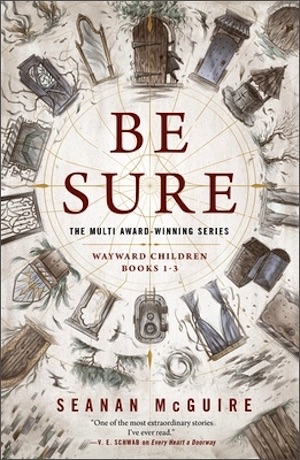

Be Sure
In today’s poems, the dead must be fed more literally. Davitt’s feeding is ritualized and controlled. It might be alarming to think of your bread as a colony organism, but the formal exchange keeps everything in its place. Food is a transaction with, and preservation of, the dead. It’s also a poem of comfort, with both appetites and with grief. Feeding the living keeps memories alive, and fuses spirits in a much more pleasant way than that suggested by Al last week.
The perennial questions: What’s frightening, and how should we respond to frightening things? Death, death is frightening. And we respond with food: post-funeral potlucks, care packages for sitting shiva, favorite dishes that invoke good memories years later. When we feed our bodies, and take comfort in them, perhaps so do the dead. And with that answer, we get a poem that isn’t horror, weird or otherwise. Which means that it nicely frames our options for turning the same themes into something extremely weird and deeply horrific.
(Tell your kids: compare-and-contrast litcrit essays are totally a practical skill.)
Racklin’s “Unearthen” depicts death and appetites without control or boundary, and breakdowns between human and not, alive and not, at least as complex as those in Beyond Black. There is so much going on here, all of it worrisome. First, how did “the man I once called to from the window” turn into “a body” buried under a tree in the yard? I suspect a well-deserved murder just off-screen. Deserved, because I also suspect that in this case appetites in death mirror those that developed in life. Metaphors become embodied only when the body is dead, and we’re already off to a deliciously entangled start.
The ghost’s appetite changes: first rotten fruit, then sweet things. He negs the narrator: her “heart is too ripe to eat”. What ripens a heart? What does it mean for a heart to rot and split on metaphorical ground—and is that a prerequisite to burying one’s lover under an unmarked apple tree in the first place?
There’s no ritual to control this relationship, no safe or acceptable offering. The ghost starves even while gorging on a pantry-full of sugar and syrup. The fact that he wants it so badly is what makes it insufficient—the nature of his appetite is to ruin what it touches. Davitt’s “hungry ghosts” have feeding tubes, altars, grave markers. They have hot, buttered bread: the prototypal satisfying, satiating meal. Racklin’s ghost breaks glass, uninterested in either boundaries or satiation.
All of which makes him, ultimately, the dreaded Not Human. He “gorges and grows,” forgets how to speak, sprouts toadstools. As we all know, being partly fungous is the worst. No wait, being partly fungous and breaking down door frames—that’s the worst. At least for the people on the other side of the door.
What works, though, is Davitt’s answer: feed the ghost deliberately. Set a goblin-market-style feast table overflowing with fruit and wine. And then grab an ax. (I really do have suspicions about what happened in the paragraph before the poem.) And cutting away the tree, the appetite, the heart—we get to a different sort of Not Human. Something transformed in its chrysalis, that doesn’t need to stay and indeed can’t stay. Something that can’t be remembered: too terrible or too beautiful or both.
What’s left behind is a surprisingly happy ending. The monstrous thing has flown, leaving behind the inverse of the Color. Roses and raspberries bloom, red and sweet, and a much-diminished ghost licks nectar on the edges of a reclaimed life.
Anne’s Commentary
Let’s just get it out of the way, and this is an earnest question, not ah-hah-caught-you-out snark: Why does Davitt call yeast bacteria? Yeast being a high-ranking member of Kingdom Fungi, it’s notoriously likely to turn up its, um, budding bodies at Kingdom Prokaryote (Bacteria), whose members lack the membrane-bound nuclei all self-respecting cells have!
I’m here for you, Yeast, a huge fan, as long as you stick to nonhuman hosts, i.e., not me.
Atlas Obscura, archivists of all things wonderfully weird, notes that the practice of feeding the dead is an ancient one, dating back beyond those late-adopter Romans to the Egyptians, Greeks, and even a 3000-year-dead Phoenician king named Ahiram, whose tomb is guarded by a curse that mentions libation tubes. I wonder what the curse was about. Maybe Ahiram wanted more snacks crammed down his tube, or else? Maybe he didn’t want any food or drink hitting him in the face and cluttering up the tomb? Maybe he hoped to take advantage of death to lose a few pounds, and now all these calories, damn.
In cultures that feed the dead, the living often share the meal by eating at the graveside or tomb themselves. It makes emotional sense—a universal way of showing love and respect, particularly on special occasions, is to gather together for a feast. But another reason for providing the dead with posthumous nourishment is not so cozy. You do not want to let the dead starve or parch; such neglect can only lead to hangry specters, not to mention vampires and zombies.
Davitt’s poem mentions that Romans wanted to “appease the hungry ghosts,” but otherwise it’s a life- (and death-) affirming piece. The first stanza establishes that bread is a living thing created by the cooperation of all four elements: The “earth-given grain,” “the sky-born water,” the exhalations of the yeast (air); and the fire of the oven. The second and third stanzas describe traditional Roman and Mexican practices, then proceeds to speculate on how the dead might identify with bread. Perhaps they can “sniff out the life in it, the bacteria still struggling to survive their own cremation,” their entombment in “the rigid shape” and “mobile grave” of a loaf. Or perhaps they, like the living, simply enjoy the glorious aroma of warm fresh bread. The simple alchemy of flour, salt, water and yeast is a profound pleasure that must live on in the nebulous memories of the dead, if not in their desiccated olfactory nerves.
And what if the dead, reenergized, pass in spirit form into the bread and wine that living celebrants consume at their graves? Davitt concludes that the dead may end up “nestled in our hearts and bowels,” which is better than being stuck staring for eternity at faded plastic roses. That they nestle in our hearts could be a cloying notion if this nestling spot wasn’t paired with our bowels, not so sweet a resort to the common imagination. For me, the second destination of the well-fed dead shifts the poem back to pleasantly unnerving weirdness. Ghosts in the GI tract, that can’t be good for one’s digestion, can it? Better not to ponder the consequences.
Racklin could have written “Unearthed” as a short story, but her decision to make poetry of the weird little narrative is an excellent one. By concentrating on well-wrought imagery rather than on the more “dilute” exposition of prose, she creates an intensely sensual take on the hungry dead.
I can’t help comparing the haunting of Racklin’s narrator with that of Alison in our current novel-length selection, Hilary Mantel’s Beyond Black. Both must contend with unruly, surly, demanding, home-invasive and messy ghosts. Both are remarkably tolerant of their revenants—I mean, they don’t run screaming from them like I expect most of us would do. Alison, born powerfully psychic, has always lived with ghosts, and so pretty much takes them as a natural rather than an alien part of the life-death continuum. Racklin’s narrator could also be a spiritual adept, maybe a witch of sorts; she at least knows what to do about her ghost when his transformation from human form to fungous beast becomes too much to have around the kitchen. In this she’s more fortunate than Alison, who struggles to wrangle her nasty “spirit guide” Morris and is unable to actually exorcize him.
Racklin’s ghost isn’t merely peckish, to be satisfied with an occasional heel of bread and splash of wine. He’s ravenous and driven with it, crying out from his grave in the dark, “Tell me, why am I always starving?” Unlike the narrator, he doesn’t know that “longing is a greedy thing,” one that “will grow sour in his sleeping veins,” one that will make him a monster that craves “roses and ruins alike.” Narrator, on the other hand, knows that only rot can grow in “the garden of a dead man’s heart.”
As for the narrator’s heart, the ghost rejects it as “too ripe to eat,” presumably too sour or bitter for a sweet tooth like himself. Still, if narrator’s larder runs out of sugar and syrups, he will have to change his diet, for “what else is there for the dead to eat, but the living?”
That threat is too much for the narrator, who throws a propitiatory feast for the ghost. Lulled into “a sugary haze,” he sinks deep beneath the apple tree shading his grave. The narrator first cuts down the tree; as if proximity to the ghost’s “tainted womb” of a tomb has made the tree his airside extension, it moans and scratches at the narrator. The narrator persists, next kneeling atop the unearthed corpse, slitting his throat, excavating the “chrysalis” of his heart to release a—something—that flies and “smelled of rain” and is “light.” After this cleansing, “every earthen thing about [the buried man] died,” leaving behind “the man I once called to from the window.”
Before reburying the corpse, the narrator kisses his face and puts a marigold in his pocket. The marigold has a whole complex of traditional meanings. It’s associated with magic, luck, healing, and warding off evil. It’s used in Dias de los Muertos celebrations to lure spirits to offerings left for them in the home. In the Victorian language of flowers, the marigold represents loss, grief and mourning. There’s a whole smorgasbord of meanings to apply to this poem, come choose any and all you like!
Racklin’s ghost seems a decent sort of guy after he sheds “earthen things” like sugar addiction and can find satisfaction in a delicate licking of wild raspberry nectar from his ethereal fingertips. At least that’s how the narrator now sees him in the “sunset’s glow.” He may be apparition or may be memory. Happy ending?
For the narrator, I guess. What I was wondering about from line one of the poem is why the narrator buried the man on their own property, without any help or funeral as far as we know, or a coffin, for that matter. Looks suspicious to me. Either the narrator murdered the guy (out of malice or self-defense?), or he killed himself, or he just died and the narrator planted him under the apple tree for (eccentric?) reasons of their own. Is the ghost actually starved for revenge or justice, with food the symbolic and unsatisfying substitute? The ghost says the narrator’s heart is “too ripe to eat.” Isn’t “too ripe” the first stage of rottenness? Or is the ghost acknowledging that the narrator’s heart is swollen and bitter with grief, and he’s looking for sweet succor, thanks.
I don’t really need answers to the mystery. It’s enough, the beautiful-terrible stream of Racklin’s imagery, the idea of a starved ghost gorging his way to monsterhood, then redeemed to humanity by the narrator’s magic, the breaking open of a transition-chrysalis that imprisons his butterfly-soul in the earthly plane.
The hungry, hungry plane of “earthen things.”
Next week, join us for Chapter 9 of Hilary Mantel’s Beyond Black.
Ruthanna Emrys’s A Half-Built Garden is out! She is also the author of the Innsmouth Legacy series, including Winter Tide and Deep Roots. You can find some of her fiction, weird and otherwise, on Tor.com, most recently “The Word of Flesh and Soul.” Ruthanna is online on Twitter and Patreon, and offline in a mysterious manor house with her large, chaotic, multi-species household outside Washington DC.
Anne M. Pillsworth’s short story “The Madonna of the Abattoir” appears on Tor.com. Her young adult Mythos novel, Summoned, is available from Tor Teen along with sequel Fathomless. She lives in Edgewood, a Victorian trolley car suburb of Providence, Rhode Island, uncomfortably near Joseph Curwen’s underground laboratory.










